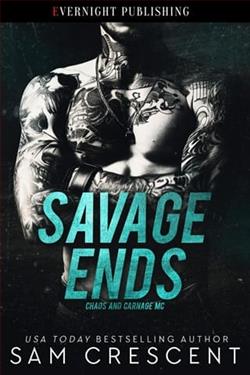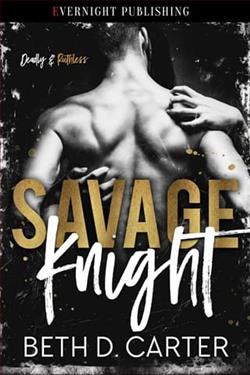Page 25 of Scr*wed By the Minotaur in Hallow's Cove
The place was in shambles—no, worse. I’d seen post-flood basements in better shape. The walls were peeling, ceiling drooping with water weight, shelves buckled and vomiting ruined packets of seeds. Puddles reflected the chaos, and the air stank of dead things: mold, mildew, memories.
Now I understood why Lea hadn’t called. She’d lost her entire shop.
“Britt, right?” I said. My voice was soft, careful. She looked tired, the skin under her eyes gone gray and raw. “Is Lea here?”
Britt shook her head. “No, she went to her mom’s. I can give you the address if you want.”
She scribbled on a scrap of paper, handing it over with a knowing look. My heart pounded as I turned to leave, clutching it like a lifeline—grateful Britt didn’t grill me.
As I arrived at the house, the sun dipped below the horizon, casting a warm glow over the yellow-painted exterior. Lea’s car was parked outside, a reassuring sign that injected me with a burst of hope. I lingered in the car for a moment, trying to organize my thoughts and come up with the right words to say.
Eventually, I abandoned the effort, trusting that it would come when I saw her. I knocked softly on the door, careful not to startle her. There was no way she’d anticipate my arrival at her mother’s house—especially at night. However, my gentle knock went unnoticed.
I knocked again, a little louder. Still nothing. I waited, straining for any sound, any sign of movement from inside. The silence stretched, and a knot tightened in my gut. I wasn’t leaving until she heard me.
One more knock, harder this time, and the door creaked open under my fist. I hesitated, then stepped inside.
“Lea?”
My voice echoed through the dimly lit hall. The air was thick with the scent of dust, and I moved through the house, my footfalls too loud, the silence too heavy.
I found her in the living room. She was curled up on the floor by the window, where she must have watched the sun set over the empty street. Her arms wrapped tightly around herself, and her head was buried as if hiding from the world. I heard the muffled sobs before I even saw her face, and the sound hit me like a punch to the chest.
This was what she’d been dealing with alone, the enormity of it all collapsing around her. The sight of her, so vulnerable and raw, was almost more than I could bear. I had been so consumed with my own fears that I hadn’t stopped to consider that she might be drowning, that the silence was more than avoidance—that it was despair.
I dropped to my knees beside her, the sight of her, inconsolable on the threadbare rug, knocking the breath from my lungs. I didn’t know what to say, how to fix it. I wanted to pull her into my lap, fold her up and tell her nothing would ever touch her again. But it was her shop, her house, her heartbreak, and I was just an intruder.
I settled down on the floor, ensuring there was an inch of space between us, and tried to find my lost voice. “Lea,” I whispered gently. She flinched but remained still. “I’m here.”
She turned to me, her eyes red and swollen, almost bruised-looking. For a moment, I thought she might ask me to leave. But instead, she just stared at me, hollow-eyed, as if I were another cruel illusion her mind had conjured.
I did what I’ve never been good at: I waited. I waited for her to come to terms with herself, to lash out at me, or to send me away. I was ready for any of it. But she only tucked her chin down, avoiding eye contact, her breath catching in slow, shuddering waves.
I sat cross-legged, my elbows on my knees, silently matching her inhale for inhale, exhale for exhale. I wanted to touch her, but I didn’t. I couldn’t. Not unless she asked.
Eventually, she wiped her nose on the sleeve of her sweatshirt and let her head loll back, exposing her throat and the sharp curve of her jaw. Her voice, when it came, was brittle as the bones of a starved bird. “Did Britt call you?”
I shook my head. “No. I just—I had to see you.”
For a long time, she just stared at me, like she didn’t quite know how to let me in. Then she shook her head, a wet hiccup of a laugh escaping her. “I haven't even started clearing out her bedroom,” she said, voice scraping on the wordher. “I left everything. The closet, her shoes… She’s been gone months and I still can’t even move the goddamn toothbrush from the bathroom counter. Is that pathetic or what?”
“Not pathetic,” I said. “You don’t let go of people like that in a weekend. Or a year. Or ever, sometimes.”
She swiped at her face, half-defiant. “I thought if I just left it there, it wouldn’t really be gone. But I walked through the shop today, and it was like… every piece of her life was turning to mold. And I still couldn’t make myself box it up.” Her voice dropped, barely audible. “I’m sorry for not calling. I just didn’t know what to say. Didn’t want to ruin whatever-this-is with all this… mess.”
I shook my head, inching a little closer. “You could call and scream at me for an hour and it wouldn’t ruin anything.”
She let out a sound—almost a laugh, almost a sob—and scrubbed her hands over her face. She seemed smaller today. I realized, seeing her now, how much of her I’d missed in the last three days, and how much I wanted to un-miss, if I could.
I sat with her like that, in silence, until the light outside went blue and brittle. I didn’t try to fix it, didn’t try to fill the space with easy words or empty reassurances. I just stayed, andeventually, she let herself lean against me, her head heavy on my shoulder. I held her there, as if it was the most natural thing in the world, the only thing I was ever meant to do.
She was cold. It seeped through her sweatshirt and the thin cotton of my shirt. I shifted so that her whole side pressed against my ribs, my hand braced awkwardly on the carpet behind her. We watched the last light fade off the face of the house across the street, the windows going dark one by one. There was a peace in that, somehow, in watching the world close down its day.
She spoke again, her voice almost normal. “You must think I’m a basket case,” she said, not looking up.
I shook my head, then realized the gesture was wasted if she wasn’t watching. “I think you’re grieving,” I said. “That’s not a crime.”
“Feels like it should be.” She drew a circle on the floor with the tip of her finger, and for a second I was hypnotized by the spiral. My hand moved before my brain caught up, my thumb tracing a slow, uncertain arc over her knuckles.















